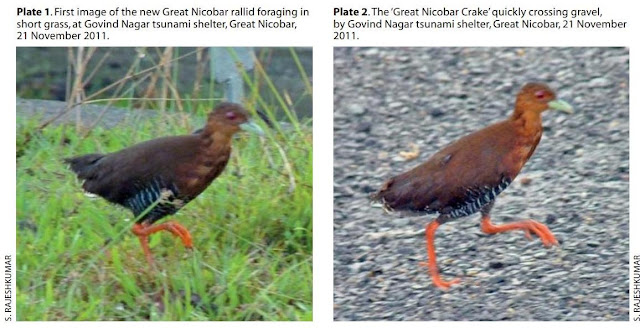Scientists at the Zoological Survey of India (ZSI) have discovered a new bird species from the Andaman and Nicobar islands of India. The bird which is now named as Great Nicobar Crake is an unreported member of the Rallina species of birds which are usually called Water Rails or Crakes.
 |
| Photos of Great Nicobar Crake published by the journal |
According to scientists, the Water Crakes or the Rallina species of birds are very rare and only 8 species are known so far. IUCN considers these birds as data deficient since their rarity makes it difficult to compile data on these birds.
Birds of Rallina species are found in Australia and Asia and 3 are seen in India. Among the three, Andaman Crake (Rallina canningi) which is found in Andaman and Nicobar Islands are endemic and is included under the Near Threatened category. As the report of the new bird is now limited only to Andaman and Nicobar islands, it is highly likely that Great Nicobar Crake is also endemic to the islands.
According to the paper titled "An apparently new species of Rallina crake from Great Nicobar Island, India" published by S. Rajesh Kumar, C. Raghunathan and P.C. Rasmusssen of ZSI, Great Nicobar Crake cannot fly but can run fast. Usually found near water bodies, Great Nicobar Crake is a thick and short bird, with heavy legs and moderately longer toes and short claws. It has moderately long neck and a short tail.
The discovery was made as part of an ongoing ZSI attempt to map the fauna communities of Great Nicobar Biosphere Reserve (GNBR). The project is being carried out under the man and biosphere programme of UNESCO with the sponsorship of Ministry of Environment and Forests.

No comments:
Post a Comment
Please feel free to have your say on our stories. Comments will be moderated. anonymous Comments will not be approved. No links in the comment body unless meant for sharing a very relevant info.